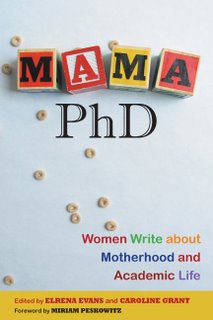Fifth Anniversary Update: Natalie Weaver
January 6th, 20141) What’s changed for you (or not) since the book’s publication?
The most important thing that happened to me since the book was published is the birth of my second child, Nathan. Now I have two sons (4 & 8), who keep me very busy. I have also managed to publish three academic books: Marriage and Family: A Christian Theological Foundation (Anselm, 2009); Christian Thought and Practice: A Primer (Anselm, 2012); and The Theology of Suffering and Death: An Introduction for Caregivers (Routledge, 2013). I also have self-published two art books: Interior Design: Rooms of a Half-Life (CreateSpace) and Baby’s First Latin (Booksurge). In terms of career development, I applied for promotion and tenure when I was pregnant with my second child. While only a few weeks old, I carried my new baby in a sling into my tenure meeting with my dean and academic vice president. He was nursing when they told me I had been advanced. Now, five years since Mama, PhD was published, I am again building a portfolio, this time to apply for full professor rank. I chair two departments at Ursuline College, and I am the newly elected secretary for the Catholic Theological Society of America. In between running the kids to school, Tae Kwon Do, and swim lessons, I am also writing my fourth academic book ~ Made in the Image of God: Intersex and the Revisioning of Theological Anthropology (Wipf & Stock, 2014).
2) How do you see things changing (or not) for women in higher ed?
Well, sadly, I do not think things have changed much in a very long time. In my own experience, I marvel not at my ability to work professionally but at the fact that I have done so while being a full-time, round-the-clock mom. My husband and I (along with our third full-time caregiver – my own mom) have an attachment style of parenting, so the kids are almost always with us. They travel with me to work conferences; they sit in the office while I write; they are driven to and from school each day; I pack every lunch; I volunteer with the PTO; and so on. I have learned more as a mom about love, compassion, service, sacrifice, endurance, time-management, leadership, conflict resolution, and so on than I have in any other context. These things are critical to my field, Catholic theology, which is sorrowfully still dominated by patriarchal ideologies and male professionals (clerics, scholars, etc.). So, when male colleagues, especially clerics, for example, publish a book or write a new class, they have not done so under the extraordinary circumstances of nursing a child through surgery or the more routine tasks of unceasingly caring for the daily needs of a family (food purchase and preparation, laundering uniforms, baking for school parties, driving to sports tournaments, brushing teeth, and helping with long division problems). The greater accomplishment, in my opinion, is the achievement of the mother who has done these vital tasks for her dependents while still producing scholarly work. Yet, in my experience, the woman’s excellence and multi-layered commitments are viewed with suspicion ~ for, how could good scholarship come of such splintered focus? Better to trust the old, safe, pristine model of scholarship not done on the soccer field. I think men are an easier hire for theology departments. I know men are paid better. And, some men, especially clerics, have greater opportunities because of their roles within the Church that in turn serve to advance their academic work in ways from which women (because they are women) cannot benefit. As much as I would like this to be otherwise, the change is slow if and where it happens at all.
3) What would you like to see happen for women in higher ed in the next 5 years?
I am still conflicted over the fundamental issue of a woman’s personhood that underlies every question of a woman’s work. We cannot both do and not do at the same time. We cannot both experience the joy of professional accomplishment and the freedom of no professional responsibility at the same time. We cannot both mother and be free of the work and worry of mothering at the same time. We choose one, or the other, or both at different times, or both at the same time, and then, we live with our choices. In my case, I could and can do less from a professional point of view. It wouldn’t ruin me at this point to slow down. But, instead, I started taking some classes again in classical Hebrew, and I am thinking about getting another degree. I can’t blame my school or the Church or my family or the universe for my sense of feeling simultaneously driven and overwhelmed. My husband and I are talking about a third child, but I also have some extensive travel plans on the horizon. So, we have to choose what to do and when, and the fact of a choice itself is not inherently unfair even if the consequences are weighty for me/us. These things are somewhat beyond institutional repair. A school cannot mend a mother’s broken heart when she returns to class for the first time after having her baby.
But, her school can pay her fairly and give her (and her male colleagues) generous family leave time around the birth and care of children. While many things cannot be fixed, pay and time can be adjusted to be equal for men and women and also considerate of the tasks of parenting in matters of promotion and tenure. And, if not equal pay, I would at least love to see schools required to disclose their salary schedules so women could actually see by how much they are under-compensated across the board.


 Join us on Facebook
Join us on Facebook